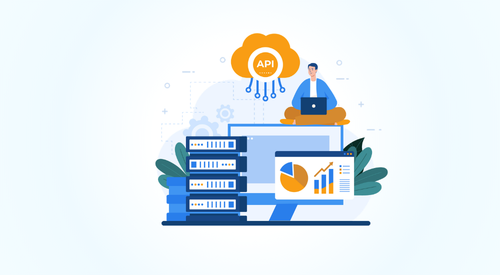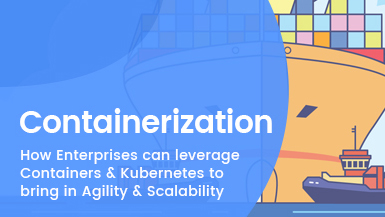
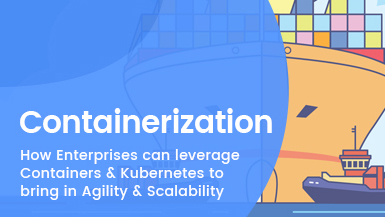
With virtualization paving the way, enterprises gradually got accustomed to faster application development and testing time. For many enterprises, virtualization dramatically transformed the IT system from waterfall methodology to agile and DevOps.
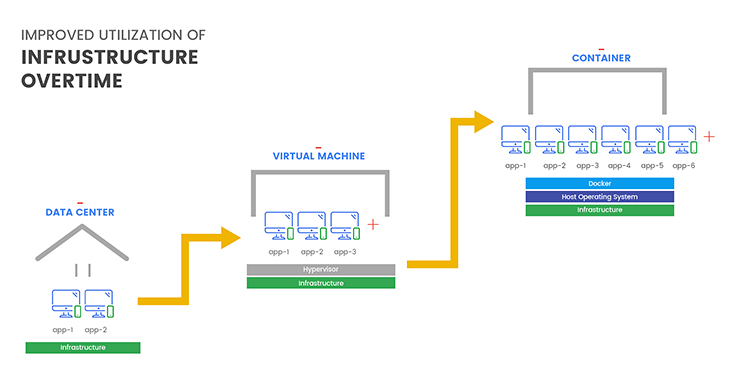
But virtualization was just the first step for enterprises to experience the advantages of agility and speed; now, Containers have come up as the next big hop beyond virtualization. Containers can help you to further optimize your server resources compared to Virtual Machines (VMs). When compared to VMs that are running a similar workload, Containers are more competent at maximizing CPUs and memory use, also, containers initiate in milliseconds while VMs take minutes to boot up. This means, with containers, you can achieve more for the same hardware.
What are Containers and Why Should Enterprises Think about Containerization?
To simplify it, containers are key to get the application to run consistently when shifted from one computing environment to another.
Before diving into more details, we’ll first need to understand the basics of containers and virtualization. Basically, Containers shrink-wrap the whole ecosystem into one unit – an application along with its dependencies, binaries, libraries, and configuration files that are essential to run it. The application when shrink-wrapped, is called an “image.” Containers run instances of images together with other abstractions needed to run the images. While traditional virtualization allows you to divide your physical servers into several Virtual Machines (VMs) in order to share the hardware and use it. Usually, a container is of a few megabytes in size since they share their host’s Operating System (OS), whereas a VM along with its whole OS will possibly be of several gigabytes in size. Hence, containerization offers a more effective way of virtualizing physical hardware compared to the traditional VMs.
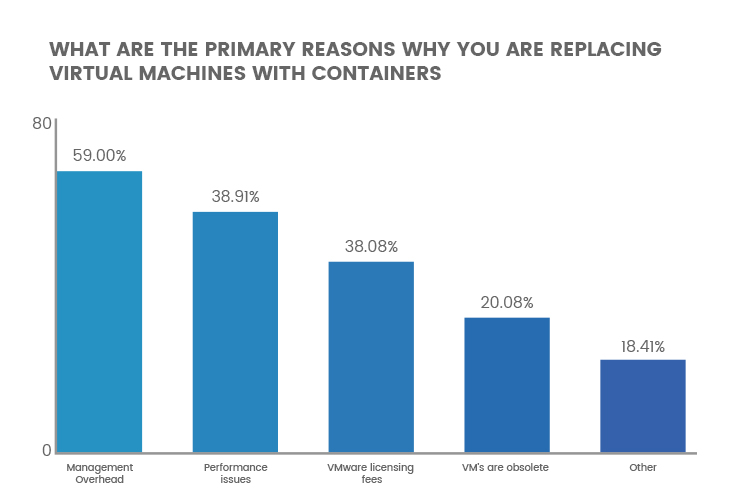
Let’s dive deep to understand why containers can be really impactful compared to VMs:
Multi-cloud Flexibility:
One of the major benefits of containerization is that it lets you recognize the potential of both hybrid and multi-cloud. Nowadays, most of the enterprises are already running multi-cloud environments and containers can actually make it much easier to run any of your applications on any private cloud service, public cloud, or even on a combination of private and public clouds. This empowers you to set the correct workloads on the correct cloud in order to avoid vendor lock-in, and achieve the best fit, with the right features, leveraging the power to migrate at the right time. This will certainly help you realize more return from your IT investments.
Cost Benefits:
You can significantly cut down your infrastructure costs with containers — sometimes hugely if you’re functioning on a massive scale. It empowers you to pack two to three times as many as applications into a single physical server since containers shrink-wrap the whole ecosystem into one unit – an application along with its dependencies, binaries, libraries, and configuration files that are essential to run it. While VMs consume a lot of system resources as each VM runs not only a full replica of an operating system (OS) but a virtual copy of all the hardware, which the OS requires to run.
Faster time to market:
Containers need the application to be broken into smaller independent constituents known as “microservices”. This, in turn, can improve the quality and time for testing, simplify the deployment process, and diminish the difficulty of integration while making the overall development process significantly faster. This means you can release new versions of the application much faster with more operational agility, greater security and your team have to tackle a fewer problem in making that software available.
IT Infrastructure Reduction:
Containers help you to cut down your costs by almost 40 percent by increasing your application workload density, achieving better utilization of your server compute density and diminishing your software licensing costs.
IT Operational Efficiency:
With containers, you can gain up to 40 percent operational efficiency by organizing and automating the management of different applications and infrastructure under a particular operating model.
Furthermore, containers enable you to create a portable, reliable operating environment for developing, testing and deploying applications. That’s a winning threesome!
How Can an Enterprise Start Its Container Journey and Adopt a Container Management Platform?
An enterprise must identify a representative “first mover” application and identify metrics for success, key milestones, and migration strategy to a new environment.
The criteria to identify “First Mover” are
- Future business goals
- Auto-scale applications
- Query petabytes of data
- Cost/benefit analysis
- Ideally, we want high benefit with acceptable cost
- Level of effort
- Consider transformation when the effort is less than or equal to the effort to lift and shift
- Current skillsets
- Ready to support a managed service with minimal training
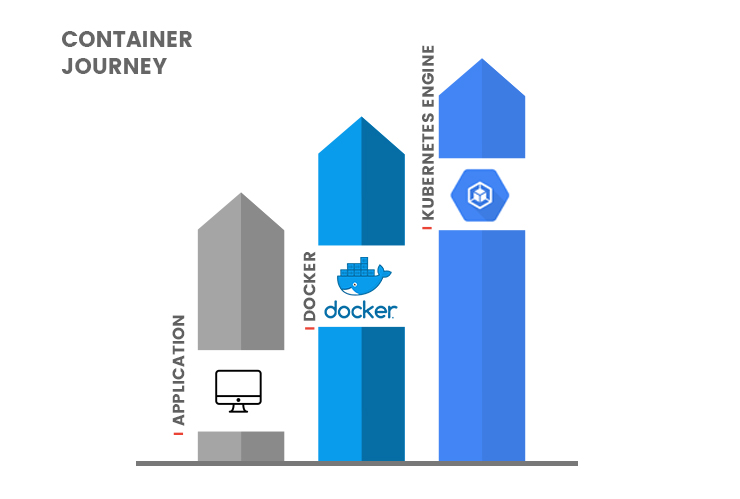
Containerization empowers you to host way more containers in a single server compared to what you can use VMs for the deployment of your applications. The job of Kubernetes in an IT infrastructure is identical to how an order picker functions in a warehouse. An order picker is supposed to pull selected items from storage and arrange for their shipments, similarly, Kubernetes acts as an orchestration solution that automatically tracks, schedules and orchestrates containers.
To wrap up, containers make your applications more cost-efficient and portable, while Kubernetes automates the management of containers at scale, making it much more viable and less-resourced exhaustive.
Irrespective of what works best for your business, taking the first step is important!
Are Containers Here to Stay?
According to Gartner, by 2020 the number of global organizations, running containerized applications in production, will shoot up to more than 50 percent from 2017 when it was less than 20 percent.
If you are an enterprise who are into building your own applications, aiming to make money from your applications, containers are the one that you’d be well recommended to hop on. The containerization technology has a low barrier for entry, while the low-cost of running containers at scale will provide real value and faster return on investment.
Transformation Journey of Enterprises
HSBC: HSBC adopted containerization and launched a Google Cloud-based analytics platform to meet the data security necessities of 65+ countries while empowering up to 10X faster financial crime analytics and 20X faster calculation of a country’s liquidity.
Ambra Health: Ambra Health embraced digital transformation with containers and leveraged the Google Cloud’s automatic redaction of patient data and robust encryption to facilitate their compliance team in order to authenticate global privacy requirements are met in minutes, not months.
PayPal: Using containerization technology,PayPal has moved to Google Cloud to build a software development and testing environment that is isolated from the public internet in order to ensure safety for their source code, while quickening development and decreasing resource needs.
Going Forward
Containers are the future building blocks and are here to stay. Starting from delivering applications faster, to boosting the development and deployment process to decreasing software and infrastructure costs, containers empower any kind of organization with genuine business results.
Organizations that are embracing and implementing containerization will definitely substantial improvements in terms of productivity, efficiency, speed, and agility within their IT environments.
References:
https://diamanti.com/wp-content/uploads/2018/07/WP_Diamanti_End-User_Survey_072818.pdf
If you’re looking to accelerate your business with containers, Niveus Solutions can help you out with the best services. Being a partner of Google, our architects can build a solution that will fit the needs of your organization. Contact Us today to initiate your digital journey.

